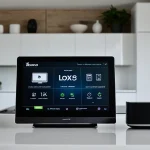In today’s rapidly evolving technological landscape, integrating your smartphone to manage smart home energy systems has become a viable and practical solution. As we delve into the myriad ways you can leverage your phone to handle energy consumption, control devices, and enhance security, we aim to provide a comprehensive guide. This article will explore the various methods and tools available to you, ensuring your home is both efficient and smart.
Understanding Smart Home Energy Systems
Smart home energy systems are a fusion of technology and sustainability, where devices and systems work in harmony to optimize energy usage and enhance living comfort. Using smart devices and home automation systems, you can monitor and control your energy consumption from anywhere, at any time.
Also to see : How Can You Use Your Smartphone to Track and Optimize Your Energy Consumption?
By integrating these systems with your smartphone, you gain the convenience of managing your home energy more efficiently. Smart energy management isn’t just about reducing energy bills; it’s also about contributing to a greener planet by optimizing energy usage and minimizing waste.
Leveraging Smart Devices for Energy Management
Smart devices are integral to your smart home setup. From smart thermostats to intelligent lighting systems, these devices can significantly reduce your energy consumption. One of the most popular smart home devices is the smart thermostat. Companies like Nest and Ecobee offer thermostats that learn your preferences and adjust temperatures accordingly to save energy.
Additional reading : Sell your iphone 15 pro: quick guide to a hassle-free sale
Lighting systems, such as Philips Hue, allow you to control the lights in your home via your smartphone, reducing energy usage by ensuring lights are only on when necessary. Moreover, smart plugs can turn off non-essential devices remotely, preventing energy waste from standby power.
Integrating these devices with your smartphone means you can manage all these functions remotely. For instance, if you forget to turn off the lights before leaving home, a quick tap on your phone can resolve the issue.
Utilizing Solar Power Systems with Your Smartphone
Solar power systems are an excellent way to harness renewable energy. By employing solar panels, you can generate your own electricity and reduce dependency on the grid. Integrating these systems with your smartphone enables real-time monitoring and control.
Apps from companies like SolarEdge and Enphase provide detailed insights into your solar energy production and consumption. You can see how much energy your panels are generating, track your overall energy usage, and even receive alerts if there’s a problem.
Additionally, some systems allow you to control when and how the energy generated by your solar panels is used. For example, you can optimize energy storage by ensuring your home uses solar power during peak generation times and switches to stored energy or the grid when necessary.
Enhancing Security and Automation
Security is paramount in smart homes, and your smartphone can play a crucial role. Smart security systems, including cameras, smart locks, and motion sensors, can be controlled and monitored via your phone.
Google Home and other smart home hubs offer integrated security solutions. You can receive real-time notifications about any unusual activities in your home, view live camera feeds, and even lock or unlock doors remotely.
Automation takes this a step further. By setting up routines, you can automate various aspects of your home security. For example, you can configure your system to turn on lights and lock doors when you leave home, all governed by your smartphone’s location services.
Optimizing Energy Efficiency and Consumption
Optimizing energy efficiency isn’t just about using smart devices; it’s about understanding and managing your overall energy usage. Your smartphone can help you achieve this by providing detailed insights into your consumption patterns.
Apps like Sense and Google Home show you how much energy each device in your home consumes. This data helps you identify energy hogs and make informed decisions on how to reduce consumption. For instance, you may discover that an old appliance is consuming more power than it should, prompting you to upgrade to a more energy-efficient model.
Moreover, these apps often suggest energy-saving tips based on your usage patterns. They can help you establish routines that optimize energy usage, such as reducing the thermostat’s temperature at night or turning off lights and appliances when not in use.
Managing smart home energy systems with your smartphone offers unparalleled convenience, efficiency, and control. By leveraging smart devices, integrating solar power systems, enhancing security, and optimizing energy consumption, you can significantly improve your home’s energy efficiency.
Your smartphone becomes the central hub for these activities, providing real-time insights and control at your fingertips. As a result, you not only reduce your energy bills but also contribute to a more sustainable future. In conclusion, the integration of smartphones with smart home energy systems is a game-changer, making homes smarter, more secure, and energy-efficient.











